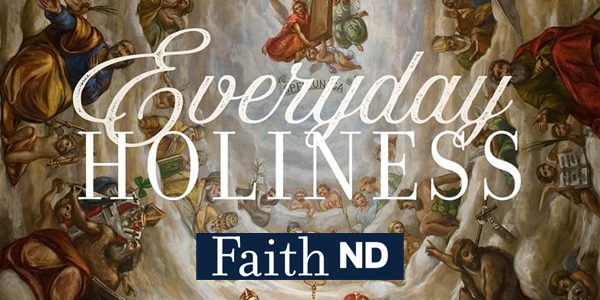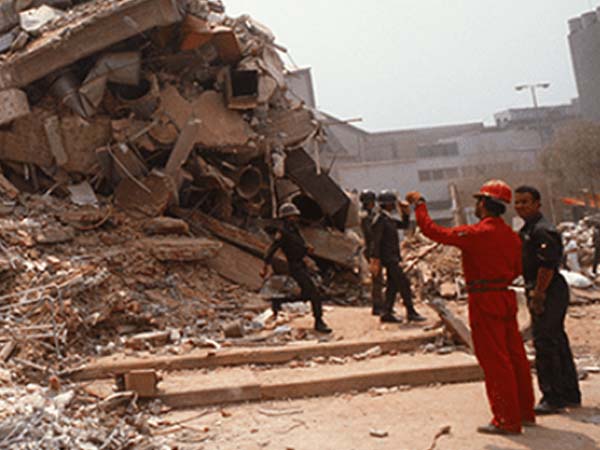Inspiring Conversations: Transforming Lives and Lives Transformed – The Myths and Terrible Truths of Human Trafficking
Subscribe to the ThinkND podcast on Apple, Spotify, or Google.
Featured Speakers:
- Sr. Gabriella Bottani, S.M.C., International Coordinator, Talitha Kum
- Sr. Ann Oestreich, I.H.M., President, U.S. Catholic Sisters Against Human Trafficking
- Chris Stevens, Co-Founding Director, Inspired Leadership Initiative
The Inspiring Conversations Series featured a discussion about the issue of human trafficking and the dedication of women’s religious life with guest speakers Sr. Gabriella Bottani, S.M.C., and Sr. Ann Oestreich, I.H.M. This virtual event was led by Chris Stevens, the Co-Founding Director of the Inspired Leadership Initiative. Through this conversation, Sr. Bottani and Sr. Oestreich discuss the realities of human trafficking as well as the important steps their organizations are taking in order to combat this large issue.
In the beginning of the conversation, Sr. Bottani and Sr. Oestreich explained their journey to discovering their vocation of sisterhood. First, Sr. Bottani described that she was attracted by the presence of God that she discovered through the marginalized people in Milano; through her hometown, she made a new discovery of God and Jesus Christ. Initially, the sisterhood did not appear to correspond with her livelihood—she had a stable job and lived in a flat. However, she was called to become an international missionary, to work towards integral human development and evangelize. Next, Sr. Ann described her own journey. Originally, she had a professional teaching job. However, the undying voice in her head called her towards joining religious life. Initially, she did not intend to stay, but she quickly realized the joy of living in community and building relationships with other people of God.
In the next topic of the discussion, Sr. Bottani and Sr. Oestreich touched on the battle against human trafficking. They explained that the fight against this terrible issue is a collaborative effort. Trafficking is the destruction of trust, so we must work together and strengthen the trust in our relationships in order to combat it. Sr. Bottani explained that Talitha Kum, the International Network of Consecrated Life Against Trafficking, works to prevent human trafficking: they identify girls with the risk of being trafficked, give them information, and give them a safehouse. Although the battle is different depending on the country, there is a universal need for trust and a common purpose.
Additionally, Sr. Oestreich clarified the often misconstrued definition of trafficking; there are more types of trafficking than sex trafficking. In addition to sex trafficking (the most prevalent kind), there are types such as labor trafficking, organ trafficking, forced marriage, etc. The prevalence and danger of trafficking has sparked the voice of the Church. In 2019, the first document in Catholic Social Teaching dedicated to human trafficking was established, called “The Pastoral Orientations on Human Trafficking”. Additionally, the Pope is incredibly supportive of the work of the religious sisters. An initiative at the University of Notre Dame, Imago Dei, was founded in order to raise funds for the sisters’ work. Imago Dei focuses on raising awareness and educating students, faculty, and staff about the dangers and prevalence of this issue. Sr. Bottani and Sr. Oestreich explained that viewers can support their efforts through prayer, awareness, and donations.
In the Q&A portion of the virtual event, Sr. Bottani and Sr. Oestreich answered a wide range of questions, touching on topics such as the role of systematic racism in human trafficking. Although any trafficking is unacceptable, Sr. Oestreich explained that human trafficking affects more people of color than white people in several countries, including the US, due to the role of systematic racism in our country. At the end of the conversation, Sr. Bottani left attendees with a powerful message, calling viewers to stand up and to not be afraid. Although the complexity of violence is terrifying, together we will find a way to change the world and support our brothers and sisters.
- God lives in His people. With every person you encounter, you see the face of God. As a result, the more people you form relationships with, the more you discover about God’s role in our lives, calling us into ministry with Him. (7:48)
- In addition to sex trafficking (the most prevalent kind), there are types such as labor trafficking, organ trafficking, forced marriage, etc. All of these forms of trafficking involve a gross “taking-away”of a person’s human dignity, allowing a person to be bought and sold as if they were an object. (18:43)
- Religious sisters should not be seen as “perfect”. However, sisters have the ability to accompany the victims of human trafficking; by sharing their lives with these victims, they are able to take this journey with them, a journey of both incredible empowerment as well as inevitable vulnerability. (21:52)
- Prayer is a powerful tool. To pray is to connect with God and with life. Prayer also has the ability to raise awareness, if we choose to pray with life instead of praying “outside life.” Additionally, we must involve the younger generation in order to give continuity to our current work. (27:19)
- We can do this; we can combat human trafficking. It is not an easy journey, but if we work together, bring awareness to what is happening, and provide services for victims, we will work in prevention of such a prevalent issue in our society today. (35:34)
- “After all, that’s what the project of religious life is about – it’s the journey into discovery of who God is, in our lives and in our world and in our church.” (Sr. Ann Oestreich, 7:38)
- “One of the most important things I have learned since I started to get involved in trafficking is that we need to work together, and we need to strengthen trust relationships, because trafficking is destroying trust.” (Sr. Gabriella Bottani, 11:10)
- “We need to involve the younger generation, the youth…We need to give continuity to this work, it is not only our work. I trust that the younger generation will [make] a huge difference.” (Sr. Gabriella Bottani, 28:55)
- “I think [it is] most important to address root causes. Human trafficking is part of a web of interconnected issues, because migration feeds into human trafficking. Climate change and natural disaster feed into human trafficking. War and conflict feed into human trafficking.” (Sr. Ann Oestreich, 34:21)
- “Stand up. Do not be afraid. Do not be shocked by the complexity and the violence of something. Together we may find a way to change and support our brothers and sisters.” (Sr. Gabriella Bottani, 52:11)
Related Content
Shannon Sharpe/Katt Williams, The Black Impact on the NFL Super Bowl & Taraji P Henson
In the first episode for Season 8, Isaiah and Tykiera talk about the Shannon Sharpe/Katt Williams Interview that took the internet by storm at the beginning of the year as well as...
watch videoEveryday Holiness: John Cavadini
Dr. John Cavadini, director of the McGrath Institute for Church Life and professor in the theology department at the University of Notre Dame, shares some of the hidden aspects...
View EventClimate Change and The Limits of Narrative
Join the Kellogg Institute for the introductory session of a workshop refining Kellogg Faculty Fellow Roy Scranton’s draft book project “Ethical Pessimism: Climate Change and...
View Event


